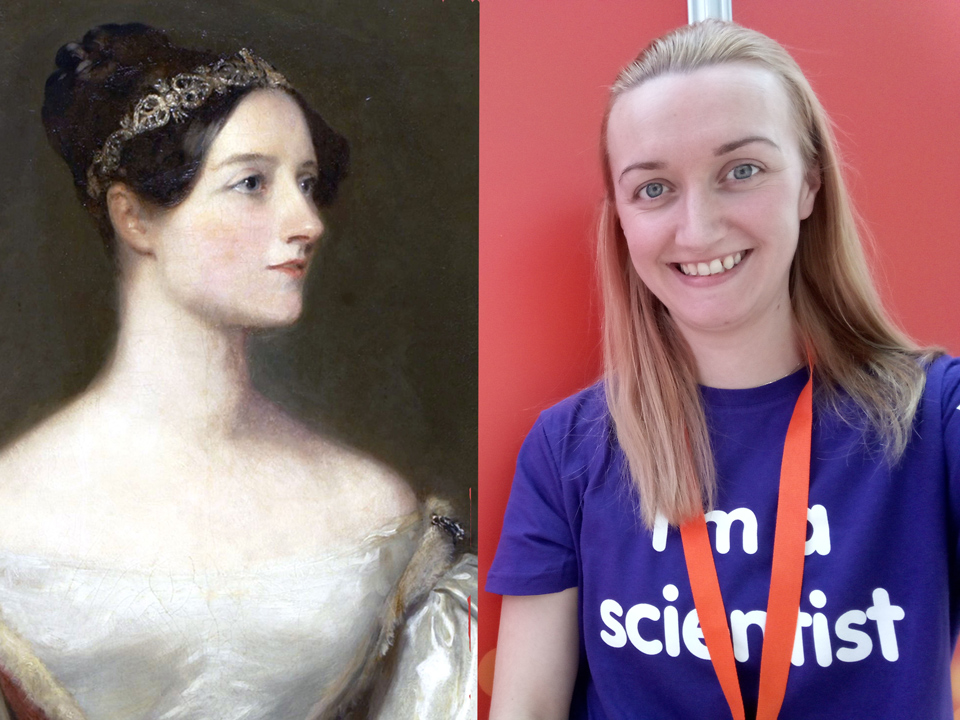Where is your place in centuries of STEM?
All of these individuals are remarkable and span three centuries of Science leading to…today’s STEM-obsessed or Arts/Humanities-focused young person! Their stories will inspire children with high learning potential, and the elements of physical disability or society’s hurdles may particularly motivate children with dual or multiple exceptionality (DME).
For a range of fascinating stories around high learning potential and DME, check out the rest of Potential Plus UK’s “Inspirational Figures” series
Ada Lovelace (1815-1852) (pictured above on the left)
The annual Ada Lovelace Day was established in 2009 to celebrate the achievements of Women in STEM.
An English mathematician and writer, Ada saw into the future and believed her work with Charles Babbage on his “analytical engine” would help build a computer age. She alone seemed to see how the proposed mechanical computer could evolve into a machine capable of expressing much more than just numbers. Ada tested the boundaries of thinking at that time even further with her desire to create “a calculus of the nervous system”; a mathematical model for how the brain gives rise to thoughts and nerves to feelings.
Aged 8, Ada had such bad headaches that she couldn’t even see properly. As a teenager in 1829 she was paralysed due to measles and by 1831 could still only walk with crutches. Despite these illnesses, and in a male-dominated environment, she studied and developed her outstanding mathematical and technological skills.
The computer language ‘Ada’, created for the United States Department of Defense, was named after Lovelace and given the Standard reference MIL-STD-1815 after the year of her birth.
- What other annual days or inventions can you find that celebrate specific people in STEM?
Ida Freund (1863-1914)
Ida Freund was the first woman in the UK to be a university lecturer of Chemistry.
Surprisingly, this was not Ida’s only major achievement. Having moved to the UK from Austria, English was Ida’s second language – and not only that, having lost a leg in a bicycle accident as a child, she wore a prosthetic limb and used a cane!
Ida Freund studied natural sciences at Cambridge’s Newnham College for Women, later becoming a demonstrator and lecturer there. It was Ida who created the first chemistry labs for women, which was very significant, as male and female students were taught in separate classes.
She championed education for women and used ground-breaking approaches to teaching, in particular, pioneering in-classroom validity-testing and structuring studies so that students had fun while they were learning! This might seem ‘normal’ these days but was highly controversial at that time.
- Just over 100 years later, what percentage of School or University, Science or Chemistry Lecturers are women? What do you think about this? (https://www.hesa.ac.uk/news/24-01-2019/sb253-higher-education-staff-statistics)
Phyllis Clinch (1901-1984)
Phyllis Clinch was born in Dublin and became a Botanist specialising in plant virus diseases, especially those in potatoes, tomatoes and sugar beet. Having undertaken a significant PhD in Plant Physiology, she helped the government’s Department of Agriculture identify plant disease agents and thereby avoid food shortages.
In 1961, Phyllis received the Boyle Medal for her scientific work and became the first woman professor of Botany at University College Dublin.
In 2016, Phyllis made history again when her portrait was hung in the Royal Irish Academy’s House; the first time women had been recognised in that way in its 230-year history! An interesting example of STEM affecting change in other fields, such as the Arts.
- Potatoes are a very significant crop in Ireland; why is her research especially meaningful?
Emma Markham (1986- ) (pictured above on the right)
Emma Markham is an inspirational modern-day STEM figure. She has an MSc in Human Molecular Genetics from Imperial College London – and in her spare time creates the Wikipedia pages for Ida Freund, Phyllis Clinch and many others! Emma is passionate about recording as many “Forgotten Women In Science” as possible on Wikipedia (see https://geneticcuckoo.blogspot.com/p/forgotten-women-in-stem.html) and encourages others to join her.
Professionally, Emma has worked in a variety of areas within Biology and non-medical bio-science (such as cancer research, genetics, virology and aquaculture) and across learning institutions, businesses, charities and for the government. She also gives talks at Science Fairs and mentors students about STEM careers.
As the decades pass, opportunities for working in STEM are broadening. Emma says “I enjoy a wide range of science and so a specific field is less important to me. I most enjoy supportive science roles where I am directly helping the scientist and the research rather than actually carrying out the science myself.”
- Would you rather be in an active or supportive science role?
You! (Year 2000+)
This is where you write your name!
Whatever your gender, what are your STEM interests and dreams? Make a ‘mind map’ poster of them and look at it every day to inspire you!
If you have physical challenges, mental health issues or peer-group problems, try to work around them, drawing strength from these ‘inspirational, remarkable women in STEM’.
And remember: “Doubt yourself less – it is okay to ask for help and you can achieve your goals. You are far more impressive than you might think.” (Emma Markham, for the 1 Million Women In Science project.)
- Where is your place in centuries of STEM?
Resources:
https://potentialplusuk.org/index.php/category/inspirational-figures/ – real-life stories to inspire learners with high learning potential and/or dual or multiple exceptionality.
A range of advice sheets from Potential Plus UK including:
The Potential Plus UK Science Let’s Explore Activity Pack with 20 challenges for KS1 and KS2
https://www.1mwis.com – a fun gallery and website for the amazing 1 Million Women In STEM project
Biographies of Ada Lovelace, Ida Freund or Phyllis Clinch can be found in more detail at www.Wikipedia.co.uk
Emma Markham’s personal story and Wikipedia editing challenge are at https://geneticcuckoo.blogspot.com/p/ with a Twitter handle of @GeneticCuckoo. Read Emma’s ‘1 Million Women In STEM’ entry at https://www.1mwis.com/emma-markham.







